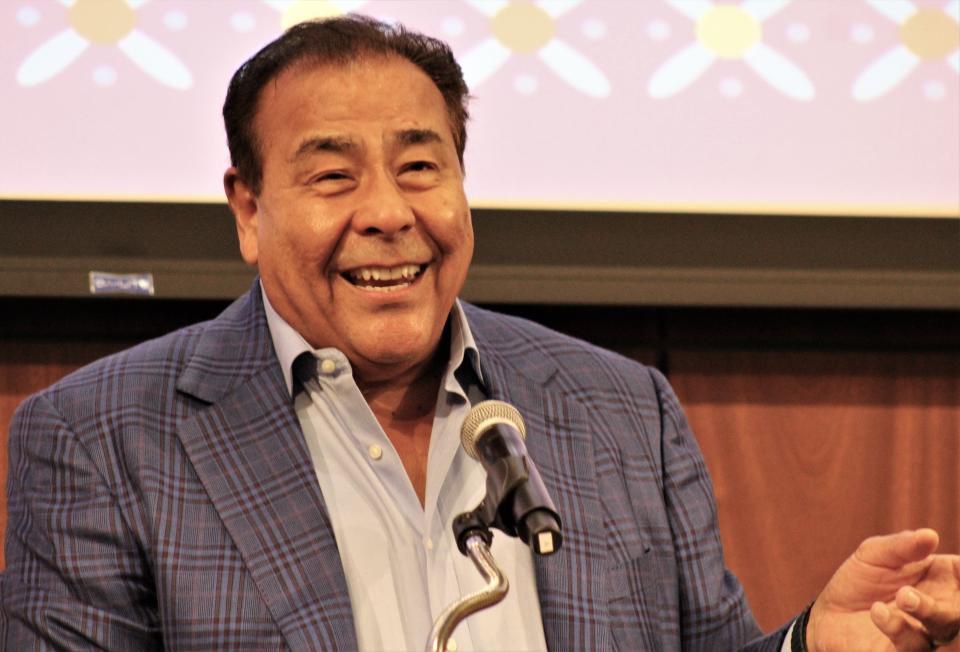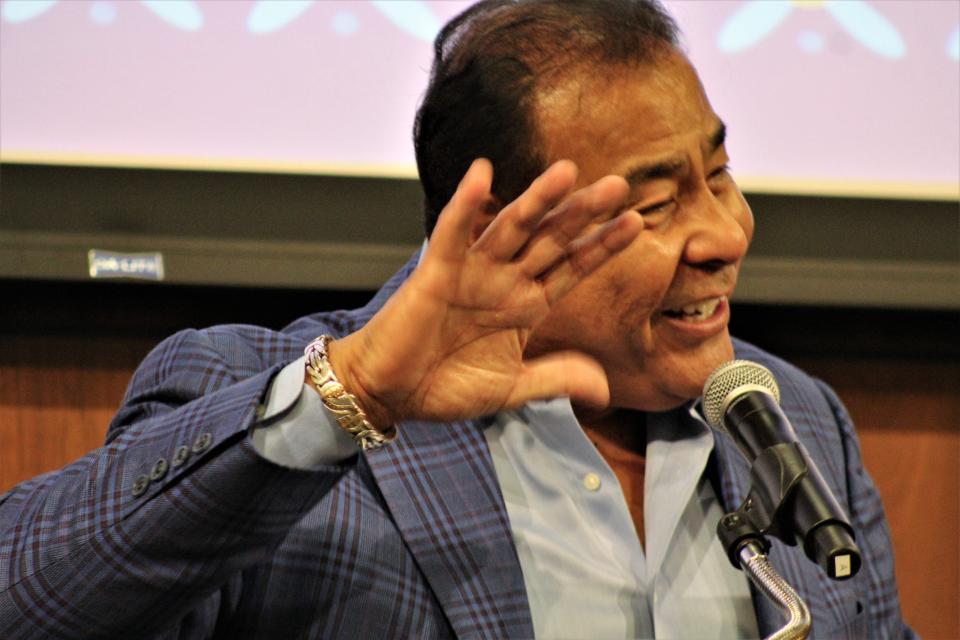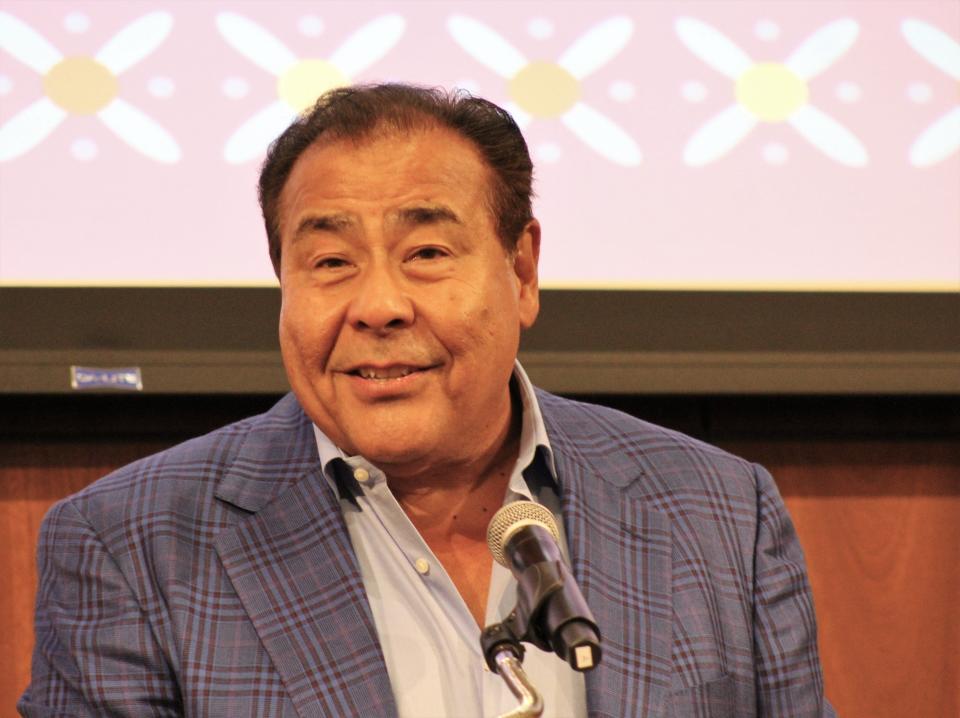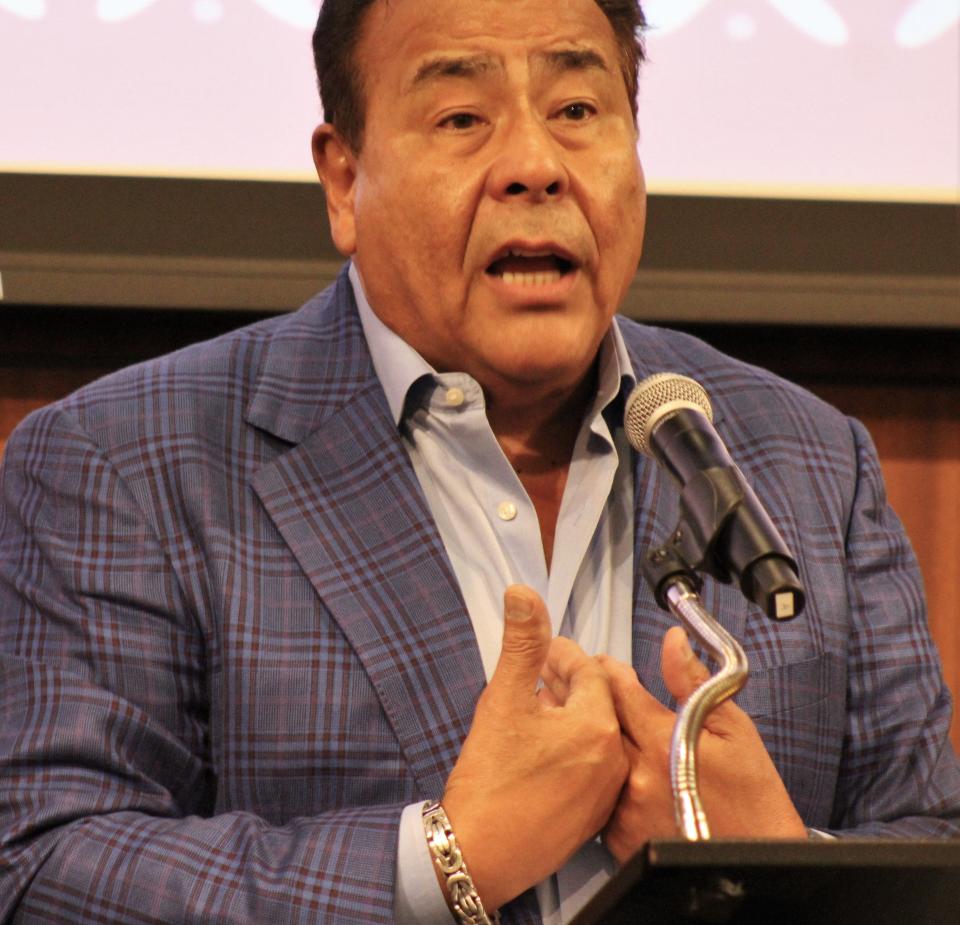ABC News correspondent delivers message of opportunity, doing the right thing
- Oops!Something went wrong.Please try again later.
- Oops!Something went wrong.Please try again later.
- Oops!Something went wrong.Please try again later.
John Quiñones said his media hero, back in the day, was Geraldo Rivera.
Cool mustache.
Got to travel the world.
Peeked inside Al Capone's vault.

To a youngster growing up in San Antonio, who at 13 wanted to be a TV reporter, Geraldo was the real deal.
Except that he wasn't. Rivera's father was Puerto Rican and his mother was a Russian Jew. He grew up in New York City.
But, Quiñones, whose family goes back seven generations in Texas, told a rapt breakfast gathering Saturday at the Hunter Welcome Center, you have to take steps in life.
Rivera represented someone more like him than others on TV.
Quiñones was on the Abilene Christian University campus to celebrate the 10th anniversary of a race and media class required of all students in the Department of Journalism and Mass Communication and taught by Doug Mendenhall.
The Emmy Award-winning ABC News correspondent often spoke directly to Hispanic students seated near the front. ACU is wanting to become an HSI - Hispanic-Serving Institution. ACU's current undergraduate enrollment is 22% Hispanic, or Latino, as Quiñones referred to his ethnicity. The bar is set at 25%.
The next challenge for ACU, and many other universities, is helping Hispanic students graduate.
Near the Hunter facility, a Special Olympics track and field meet was being held. In track parlance, Quiñones began life without even knowing where the finish line was located. In fact, for the most part, he wasn't allowed in the race.
Today, he has been with an ABC News crew in Uvalde, where it has been entrenched since May 24. There, 19 students and two teachers were killed at an elementary school a year ago. His network, he said, has been committed to telling the story of how the mass shooting has affected the city of just over 15,000 residents - not just for two weeks but for a full year.

He had a break in his schedule to come to Abilene to tell his story. His talk was both sobering and entertaining.
His first words broadcast came at the end of a commercial: "Now available at Walgreens."
Quiñones said he practiced to speak without his heavy Spanish accent. His father did not speak much English, his mother a little. Their son went to first grade not speaking English or understanding much of it. That's just the way it was in San Antonio.
He is proud of his family's heritage. No one crossed the border to get here, he said; the border moved west.
His mother pushed him to become educated, and when his father lost his janitorial job and family became migrant workers, it was his dad who asked him if he wanted to pick cherries and fill bushel baskets with tomatoes as living?
That hard work united and saved the family, sure. But Quiñones began taking the steps that brought him May 6 to Abilene to encourage students and others to do likewise.
Given a chance, their future is in their hands.
One step was being Romeo in the high school play to get over his shyness. It also afforded him a chance to kiss Juliet, which, he joked, required the same amount of practice that he gave English.
It meant going to Columbia, in New York City, to graduate school without a plan to pay for it. He knocked on doors and won a full scholarship. He joked that it came from NBC, which started him on his successful trek at network rival ABC.
His career break came by posing as a Mexican wanting to come to the U.S. for a story on immigration when he started his career in Chicago. The adventure with a coyote - a person who smuggles immigrants - was documented by a crew. But guiding his inner tube across the Rio Grande near Laredo was Part I. Part II was busting a restaurant owner in Chicago, who did not pay immigrant workers for 17 weeks.

Again, he posed as one, documenting their plight. If they spoke up, he'd call immigration enforcement.
When the Surprise! moment came - Quiñones showing up one day in a suit with his crew - the restaurant was closed, the workers paid in full and temporary visas sought.
Was Quiñones good at his job? Of course. But what helped, too, was being Hispanic. He could get closer to these kinds of stories.
That was proven later when he was sent to Central America during the unrest in Panama, El Salvador, Nicaragua and Panama in the 1970s and 1980s. Bill Stewart, a white ABC journalist, was sent to Nicaragua. Believing he was a communist, National Guard soldiers fatally shot him in 1979.
The networks changed their strategy.
While he has interviewed the likes of the Dalai Lama and Jane Goodall, Quiñones said he is best known for the popular TV show "What Would You Do?" He offered several stories, some funny, some head-shakers as people were shown in a true light reacting to situations including injury and theft.
If people today recognize him, they behave, he said. People sitting next to him at a restaurant will tip extraordinarily.
But, he challenged, what would you do when no one is watching.
Silence, he said, is complicity.
It's harder today, he said, when 'people are on their last nerve."

Be an active bystander, not a passive observer. Teach that at home, he urges parents.
Quiñones referenced the edgy song "You've Got to be Carefully Taught," from the musical "South Pacific."
"You've got to be taught before it's too late,
Before you are six or seven or eight,
To hate all the people your relatives hate,
You've got to be carefully taught!"
Instead, Quiñones said, youngsters should be taught just the opposite in a world full of marginalized people.
Quiñones said his life was a "long, hard struggle to get to ABC." In school, there was paddle used on Latino students who slipped up and spoke Spanish on campus.
But a classmate two years removed from Mexico encouraged him.
I'm going to be a lawyer, his friend said, and you're going to be reporter.
Both accomplished their dreams - his friend practices today in San Antonio.
Little Juanito, as Quiñones' mother called him, has come a long way from the boy who shined shoes for 10 cents and picked cherries in Michigan, then went to school at St. Mary's in his hometown and then Columbia.
Years later, his face is one of the best known on network TV.
This article originally appeared on Abilene Reporter-News: ABC News correspondent delivers message of opportunity, doing the right thing

